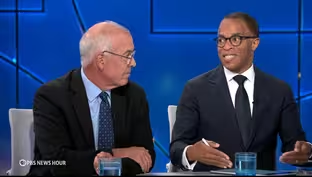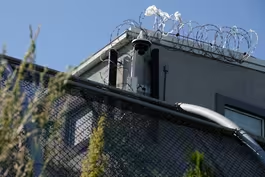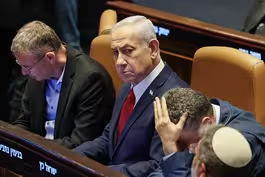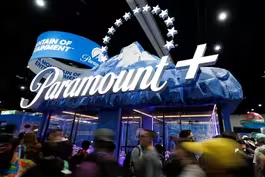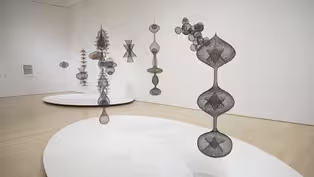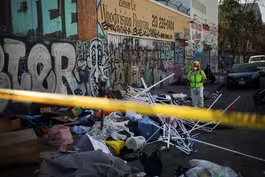
Kagan criticizes justices over lack of explanation
Clip: 7/25/2025 | 6m 46sVideo has Closed Captions
Kagan criticizes fellow justices over lack of explanation in recent Supreme Court rulings
The Supreme Court has handled a flood of appeals from the Trump administration on its emergency docket, also known as the shadow docket. In the first six months of Trump’s term, the conservatives on the court have sided with him on several key policies, but the decisions have come with little to no explanation for their rationale. Geoff Bennett discussed more with Supreme Court analyst Amy Howe.
Problems playing video? | Closed Captioning Feedback
Problems playing video? | Closed Captioning Feedback
Major corporate funding for the PBS News Hour is provided by BDO, BNSF, Consumer Cellular, American Cruise Lines, and Raymond James. Funding for the PBS NewsHour Weekend is provided by...

Kagan criticizes justices over lack of explanation
Clip: 7/25/2025 | 6m 46sVideo has Closed Captions
The Supreme Court has handled a flood of appeals from the Trump administration on its emergency docket, also known as the shadow docket. In the first six months of Trump’s term, the conservatives on the court have sided with him on several key policies, but the decisions have come with little to no explanation for their rationale. Geoff Bennett discussed more with Supreme Court analyst Amy Howe.
Problems playing video? | Closed Captioning Feedback
How to Watch PBS News Hour
PBS News Hour is available to stream on pbs.org and the free PBS App, available on iPhone, Apple TV, Android TV, Android smartphones, Amazon Fire TV, Amazon Fire Tablet, Roku, Samsung Smart TV, and Vizio.
Providing Support for PBS.org
Learn Moreabout PBS online sponsorshipGEOFF BENNETT: Supreme Court Justice Elena Kagan is urging her colleagues on the bench to be more transparent as they make more emergency decisions, including those involving President Trump.
At an event in California, Kagan criticized how the court has handled a flood of appeals from the Trump administration on their emergency docket.
The emergency docket, also known as the shadow docket, is a process the Supreme Court uses for urgent cases that are decided quickly with no oral arguments.
ELENA KAGAN, U.S. Supreme Court Associate Justice: As we have done more and more on this emergency docket, there becomes a real responsibility that I think we didn't recognize when we first started down this road to explain things better.
I think that we should hold ourselves sort of on both sides to a standard of explaining why we're doing what we're doing.
GEOFF BENNETT: In the first six months of President Trump's second term, the conservatives on the court have sided with him on several key policies, including allowing the administration to continue mass firings at multiple government agencies and to cancel certain federal grants.
But those decisions have come with little to no explanation for their rationale.
For more on all this, we're joined now by SCOTUSblog co-founder and "News Hour" Supreme Court analyst Amy Howe.
Always great to have you here.
AMY HOWE: Thanks for having me.
GEOFF BENNETT: So, before we get into the details of how the court is using this emergency docket, explain exactly what it is.
AMY HOWE: So one way to think of it is to think about what it's not.
And most people, when they think of the Supreme Court, think of the decisions, like the decision on affirmative action or the decision on same-sex marriage, in which the court agrees that it's going to take the case.
There's extensive briefing, usually over the course of a couple of months.
The court hears oral arguments in open court and then issues a decision in open court.
The justices read a summary.
There's a lot of news coverage.
And the emergency docket or the shadow docket, as it's sometimes called, happens outside of all that process.
And, as you mentioned, it often is a request from the federal government, but it can be from private parties or from states, for the Supreme Court to step in and do something quickly.
And often it's to put a lower court order on hold, and while the litigation in that dispute plays out, and that it can happen pretty quickly.
There's just usually a couple of briefs in the case.
There's no oral argument.
And many times the Supreme Court will issue a one-paragraph order or a very short order with little to no explanation.
And so a law professor at Chicago coined the term the shadow docket because it happens in the shadows.
The justices, some of them hate the term because they -- it sort of makes it sound a little bit nefarious.
GEOFF BENNETT: Yes.
And why has the court been relying on it with increasing frequency?
AMY HOWE: The court's been relying on it with increasing frequency because the federal government, in particular, under the Trump administration the first time, then the Biden administration, and now the Trump administration again, has been coming to it with increasing frequency, sort of exponentially.
And just to give you a sense of how often, since January 20, between January 20, when he was inaugurated, and June 30 of this year, the Trump administration came to the Supreme Court on the emergency docket more than twice as many times as the George W. Bush and the Obama administrations came to the Supreme Court in 16 years.
And the reason behind that, why it's coming to the Supreme Court so often, why the Biden administration was coming so often before that is a little bit of a depends on who you ask.
The Trump administration and the Biden administration before that would tell you that they have to come so often because you have these out-of-control trial court judges that are putting their policy initiatives or their executive orders on hold.
Opponents of the administration would say it's because the administration is issuing these orders or policies that are lawless.
GEOFF BENNETT: And what is driving Kagan's criticism?
How have the justices historically handled matters that come to the emergency docket?
AMY HOWE: So there's a pretty long history, but for a long time -- and I have been covering the court now for quite a while -- there weren't that many orders on the so-called shadow docket.
And we would think of it when I first started covering the court in terms of capital cases, and they were things that were truly emergencies.
An inmate would come to the Supreme Court, say, at noon, and say, I'm going to be executed at midnight, and you need to act really quickly.
And the justices then would say, well, we don't have time to write a long explanation of why we're acting the way we are.
We just need to act before the execution is scheduled to occur.
And that's really sort of what you might call one ticket only, something that's only going to apply to this case.
Now, with the Trump administration and with the Biden administration before that, we still call it the emergency docket, but it's not really an emergency in the sense that it's something that's happening on this incredibly expedited timeline.
One of the cases this spring involving whether or not the president could remove members of the National Labor Relations Board and the Merit Systems Protection Board -- the answer was yes temporarily - - took six weeks from the time at which the first Trump administration -- the Trump administration first came to the Supreme Court asking them to put the lower court's order on hold to when the court actually acted.
So it's not a lack of time necessarily to write opinions, though someone else has suggested that perhaps the justices can't necessarily agree on the rationale, and that's why they don't write.
But that happens all the time when the court writes its opinions in the cases in which it hears oral arguments on the merits.
What matters in the end is the result, but the justices may have different reasoning in the end.
GEOFF BENNETT: And when these decisions, the results come with no opinions or explanations, what kind of strain does that put on the lower courts in trying to understand the decisions or apply them?
AMY HOWE: It can put quite a bit, and that's part of the reason for Justice Kagan's criticism.
This criticism has come from Justice Kagan, but there's been other critics of the emergency docket, including Stephen Vladeck, who appears on this program quite a bit and is probably the expert on the emergency appeals docket, that the court has not been providing an explanation.
For example, in one of the Trump administration emergency applications, the Trump administration offered three reasons why the court should grant it the relief that it was seeking.
And it did grant the relief, but we don't know why it did.
And that's hard for district court judges.
GEOFF BENNETT: I feel so enlightened.
Amy Howe, thanks so much for explaining all of this.
I appreciate it.
AMY HOWE: Thanks for having me.
Brooks and Capehart on the Epstein files and Trump's base
Video has Closed Captions
Clip: 7/25/2025 | 13m 37s | Brooks and Capehart on the Epstein files fracturing Trump's base (13m 37s)
How private companies could cash in on Trump's deportations
Video has Closed Captions
Clip: 7/25/2025 | 5m 48s | How private companies could cash in on Trump's mass deportations (5m 48s)
News Wrap: Israel considering alternatives to Gaza ceasefire
Video has Closed Captions
Clip: 7/25/2025 | 4m 53s | News Wrap: Israel considering 'alternative options' to ceasefire with Hamas (4m 53s)
The politics behind the $8B Paramount-Skydance merger
Video has Closed Captions
Clip: 7/25/2025 | 7m 34s | The politics behind the $8B Paramount-Skydance merger (7m 34s)
Ruth Asawa exhibit celebrates her influential art and life
Video has Closed Captions
Clip: 7/25/2025 | 7m 42s | Ruth Asawa exhibition celebrates her influential art and extraordinary life (7m 42s)
What Trump's order on forced treatment means for unhoused
Video has Closed Captions
Clip: 7/25/2025 | 5m 53s | What Trump's order on clearing encampments, forced hospitalization means for the unhoused (5m 53s)
Providing Support for PBS.org
Learn Moreabout PBS online sponsorshipSupport for PBS provided by:
Major corporate funding for the PBS News Hour is provided by BDO, BNSF, Consumer Cellular, American Cruise Lines, and Raymond James. Funding for the PBS NewsHour Weekend is provided by...
